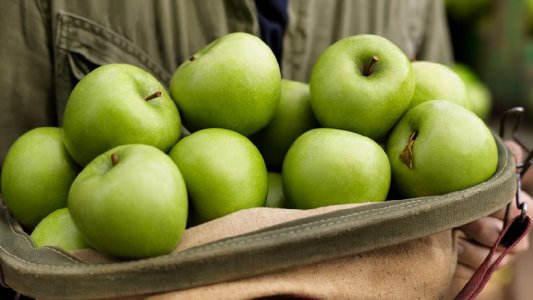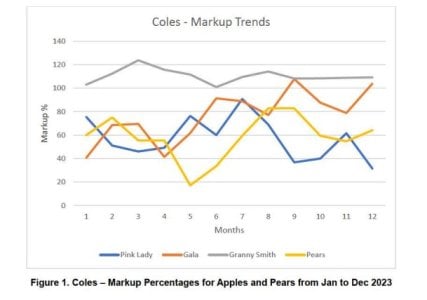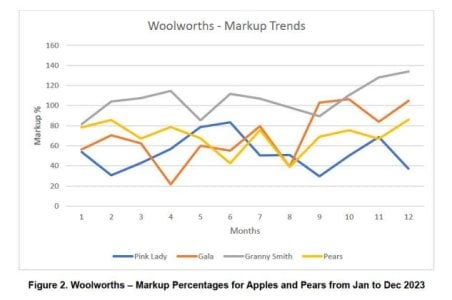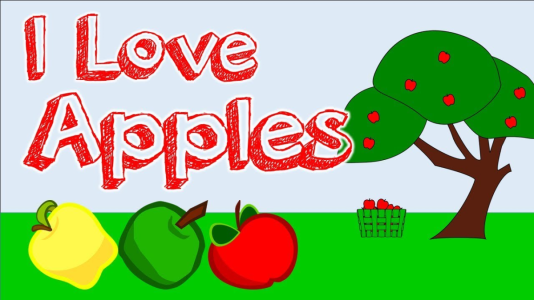Secrets revealed amidst Aussie growers' clash with Coles and Woolworths
- Replies 16
In an industry marked by fierce competition and complex supply chains, a revelation has emerged that sheds light on a hidden aspect of major supermarket operations.
Jason Murphy, an Economist and Journalist from Yahoo Finance AU, wrote about the Aussie growers’ battle against two supermarket giants–Coles and Woolworths–amidst the senate inquiry into supermarket pricing.
As the inquiry intensifies, the tension is palpable, and the stakes are high.
In the midst of this heated debate, fruit growers have decided to expose a 'big secret' about how apple pricing works in these supermarkets.
According to Murphy, green apples at Woolworths cost $0.79 each, while Pink Ladies are priced at $0.86. Royal Galas are slightly cheaper at $0.62. Pears, particularly the Odd Bunch (those with blemishes), are priced at $2.80 a kilogram.
Over at Coles, Granny Smiths are $0.83, Pink Ladies are $0.98, Royal Galas are $0.62, and their I’M Perfect Pears Prepacked 1.5kg (the equivalent of the Odd Bunch pears) are priced at $2.60 a kilogram.
Prices mentioned are as of [01 March 2024]

However, where does the supermarket make the most profit?
Surprisingly, it's on the green apples.
Murphy claimed that these apples cost shoppers double what they cost the supermarket to buy.
‘If we're being charged $0.86 for an apple, the supermarket is paying around $0.43,’ he explained.

The markup varies throughout the year and for different fruits.
For instance, the lowest recorded markup was on Royal Gala apples in April, with a margin of just 20 per cent.
‘This suggests a bumper crop that was about to go off, which the supermarket was trying hard to sell,’ Murphy added.
The markup on Gala apples is much more seasonal, peaking in spring and dipping in autumn, which aligns with the apple harvesting season.
Coles follows a slightly different pattern. Pears go on special in May, and Granny Smiths delivers big profits in March.

Fruit growers in Victoria, who grow 50 per cent of Australia’s apples and 90 per cent of the country’s pears, were furious about this pricing strategy by the supermarkets.
‘We are concerned that abuse of market power and unfair buying terms is making fruit growing uneconomic, with our members reporting being forced to sell fruit below the cost of production,’ the fruit growers expressed in their submission to the senate inquiry.
Apples are not a branded item, and the family farms harvesting apples are unwilling to let them decay in a storage shed.
‘When Woolies or Coles tell farmers the buying price, they have to sell, even if they lose money,’ Murphy said.
The growers fear retribution and punishment if they ask for higher prices prompting them to call for new rules to stop the supermarkets from exploiting their market power.
Coles, however, insists that it values its relationships with Australian farmers. In a statement, Coles said, 'We highly value our relationships with Australian farmers from around the country, which allow us to bring customers quality produce every day.'
‘Many of our relationships are multi-generational and, in some cases, extend over 50 years of supplying Coles. There are many factors that contribute to the retail shelf price of produce, including transport, labour, packaging, operating and supply chain costs, which are all considered when determining how we can provide the best value for customers at the checkout,’ the supermarket added.
Woolworths has yet to comment on the issue.
Supermarkets have enjoyed high profits recently, with food prices rising even faster than average inflation.
However, this short-term success could come at a cost as consumers and suppliers are angry, and the ongoing senate inquiry could result in tougher regulations for supermarkets.
Shoppers are already voting with their wallets, turning to ALDI and avoiding expensive items.
The CEO of Woolworths is stepping down, perhaps sensing that the good times are coming to an end.
The future of supermarket shopping could be much harder than it has been.
Hopefully, shoppers and growers will be the beneficiaries.

What are your thoughts on this issue? Have you noticed the high prices of apples and pears at your local supermarket? Share your thoughts in the comments below.
Jason Murphy, an Economist and Journalist from Yahoo Finance AU, wrote about the Aussie growers’ battle against two supermarket giants–Coles and Woolworths–amidst the senate inquiry into supermarket pricing.
As the inquiry intensifies, the tension is palpable, and the stakes are high.
In the midst of this heated debate, fruit growers have decided to expose a 'big secret' about how apple pricing works in these supermarkets.
According to Murphy, green apples at Woolworths cost $0.79 each, while Pink Ladies are priced at $0.86. Royal Galas are slightly cheaper at $0.62. Pears, particularly the Odd Bunch (those with blemishes), are priced at $2.80 a kilogram.
Over at Coles, Granny Smiths are $0.83, Pink Ladies are $0.98, Royal Galas are $0.62, and their I’M Perfect Pears Prepacked 1.5kg (the equivalent of the Odd Bunch pears) are priced at $2.60 a kilogram.
Prices mentioned are as of [01 March 2024]

Jason Murphy claimed that green apples have the highest markup among fruits. Credits: Facebook / Woolworths
However, where does the supermarket make the most profit?
Surprisingly, it's on the green apples.
Murphy claimed that these apples cost shoppers double what they cost the supermarket to buy.
‘If we're being charged $0.86 for an apple, the supermarket is paying around $0.43,’ he explained.

Coles markup percentage for apples and pears from January to December 2023. Source: Senate Select Committee on Supermarket Prices Submission 5
The markup varies throughout the year and for different fruits.
For instance, the lowest recorded markup was on Royal Gala apples in April, with a margin of just 20 per cent.
‘This suggests a bumper crop that was about to go off, which the supermarket was trying hard to sell,’ Murphy added.
The markup on Gala apples is much more seasonal, peaking in spring and dipping in autumn, which aligns with the apple harvesting season.
Coles follows a slightly different pattern. Pears go on special in May, and Granny Smiths delivers big profits in March.

Woolworths markup percentage for apples and pears from January to December 2023. Source: Senate Select Committee on Supermarket Prices Submission 5
Fruit growers in Victoria, who grow 50 per cent of Australia’s apples and 90 per cent of the country’s pears, were furious about this pricing strategy by the supermarkets.
‘We are concerned that abuse of market power and unfair buying terms is making fruit growing uneconomic, with our members reporting being forced to sell fruit below the cost of production,’ the fruit growers expressed in their submission to the senate inquiry.
Apples are not a branded item, and the family farms harvesting apples are unwilling to let them decay in a storage shed.
‘When Woolies or Coles tell farmers the buying price, they have to sell, even if they lose money,’ Murphy said.
The growers fear retribution and punishment if they ask for higher prices prompting them to call for new rules to stop the supermarkets from exploiting their market power.
Coles, however, insists that it values its relationships with Australian farmers. In a statement, Coles said, 'We highly value our relationships with Australian farmers from around the country, which allow us to bring customers quality produce every day.'
‘Many of our relationships are multi-generational and, in some cases, extend over 50 years of supplying Coles. There are many factors that contribute to the retail shelf price of produce, including transport, labour, packaging, operating and supply chain costs, which are all considered when determining how we can provide the best value for customers at the checkout,’ the supermarket added.
Woolworths has yet to comment on the issue.
Supermarkets have enjoyed high profits recently, with food prices rising even faster than average inflation.
However, this short-term success could come at a cost as consumers and suppliers are angry, and the ongoing senate inquiry could result in tougher regulations for supermarkets.
Shoppers are already voting with their wallets, turning to ALDI and avoiding expensive items.
The CEO of Woolworths is stepping down, perhaps sensing that the good times are coming to an end.
The future of supermarket shopping could be much harder than it has been.
Hopefully, shoppers and growers will be the beneficiaries.
Key Takeaways
- Economist and Journalist, Jason Murphy, wrote about Australian fruit growers who were caught in an ugly fight with major supermarkets Coles and Woolworths amidst a senate inquiry into supermarket pricing.
- Fruit industry claims revealed that supermarkets have high markups on produce like green apples, with accusations that the markup can reach around 100 per cent or more.
- Fruit growers in Victoria, who produce a significant portion of Australia's apples and pears, were troubled by market power abuse and unfair buying terms purportedly imposed by supermarkets and are advocating for new rules during the supermarket inquiry.
- As per Coles’ statement, the retailer values its long-standing relationships with Australian farmers and considers various factors when pricing produce while facing scrutiny for profits made during a period of high food inflation. Woolworths has yet to comment about the issue.
What are your thoughts on this issue? Have you noticed the high prices of apples and pears at your local supermarket? Share your thoughts in the comments below.








